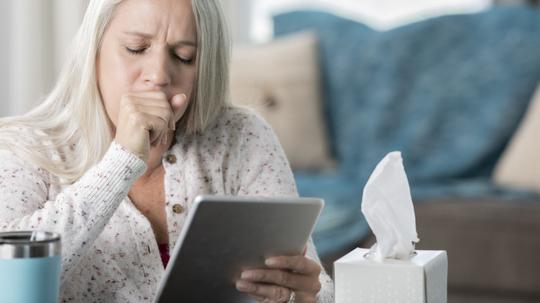
Through digital media, events, data and more, American Inno is building the largest network of local innovation, cultivating engaged startup, tech and entrepreneurial communities in 14 (and counting) markets across the country. In this story, Inno’s writers came together to highlight a local startup operating in the telehealth space.
As the country grapples with the correct procedures needed to reduce the spread of coronavirus, a crucial partnership between health care and technology has stepped up: telehealth.
Telehealth connects patients and health care providers through virtual communication, from videochat to mobile messaging services, removing the need for in-person contact.
According to a statistic from the American Hospital Association, 76 percent of U.S. hospitals utilized telehealth in 2019. That number was up from just 35 percent in 2010.
Given the current social distancing mandates from local and federal governments, telehealth has become a crucial tool in the health care arsenal. Since the virus gained national attention, the demand for telehealth resources has skyrocketed, with many providers reporting an unprecedented growth in users.
To give more people access to these virtual resources, federal agencies have also relaxed telehealth privacy regulations and expanded payment policies.
In our roundup below, we asked writers from Inno's 14 markets to share details on one promising telehealth startup and what it is doing in response to the COVID-19 pandemic.
Madison // Atlanta Inno
ExamMed is a health care tech platform that allows providers to conduct virtual visits with patients. Shortly after we started to see cases of coronavirus here in Atlanta, the company announced it would offer its services to U.S. providers free of charge for three months. I spoke with ExamMed CEO Faraz Zubairi, who said he’s allowing anyone in the health care industry — from doctors to providers to nursing homes to hospitals — to use the platform for free. The company is open to providing the platform for free to providers internationally and is talking to partners about doing so, but it would need to comply with different privacy laws in other countries, which could take time.
Brent // Austin Inno
Austin’s Medici Technologies is among the fastest-growing and most-funded telemedicine startups in Austin. Most recently, it has been in discussions with the White House about a large-scale rollout of its doctor-patient communication app with customized workflows for this unique situation. The company has raised $46 million, to date, with backing from Plug and Play and several angel investors from the medical community. Its app uses text, call and video to connect doctors and patients for diagnosis, prescriptions, referrals and billing. Medici has grown rapidly in recent years, in part by acquiring DocBookMD and Chiron Health. It says it has 20,000 doctors communicating on its platform each month. The company has 55 employees and is planning to add 12 by the end of 2020.
Rowan // BostInno
Boston-based telemedicine company Amwell (formerly known as American Well), has launched a national COVID-19 telehealth response program. The 14-year-old company established an always-on-call infection control officer, COVID-19-specific workflows for clinical operations and a COVID-19 Readiness Team. It also just raised $60 million in new funding.
In an interview with BostInno last month, Amwell CEO and president Roy Schoenberg said that Amwell was “growing very fast” as physicians and hospital groups began to realize the benefits of remote care.
“Until a few years ago, you still had to explain to people that [telemedicine] is good health care,” Schoenberg said. “Now, everybody’s getting creative about how we can use telehealth. There are cancer programs. There are programs for high-risk pregnancy follow-ups. There are opioid management programs, behavioral health programs. Literally everything under the sun that used to happen in physical, brick-and-mortar places is now taking place remotely.”
Jim // Charlotte Inno
Charlotte-based Medris Healthcare Solutions has created a telehealth solution for ambulances that allows them to communicate with physicians at the hospital in order to get information about the patient before they even enter the emergency room. Founded in 2015, the startup creates both software and hardware solutions that provide wifi, cameras, bluetooth vital sign monitors and other technology to help emergency responders better communicate with physicians in real time.
Jim // Chicago Inno
Regroup is a Chicago startup that provides virtual mental health services. The startup, founded in 2011, allows health care providers to integrate virtual mental health services directly into their own facilities, allowing patients to receive mental health care at the same place they see their primary care doctor.
Regroup says it has partnerships with providers at more than 175 health care locations across the U.S. Providing telepsychiatry services is even more pressing during a global pandemic, as many patients need care more than ever but may not be able to access a mental health clinic. Regroup is backed by $14 million in venture funding from investors such as OSF Ventures, Hyde Park Angels and Impact Engine. In 2019, Regroup merged with InSight Telepsychiatry, a telehealth company founded more than two decades ago.
Maddy // Cincy Inno
Halo Communications offers a mobile platform that enables doctors, nurses and medical staff to communicate with each other via secure messaging. The HIPPA-compliant texting system allows health care professionals to share electronic health records, physician on-call schedules, labs and directories. Halo has more than 200 health system customers in the U.S. During the COVID-19 outbreak, Halo will extend its messaging system to non-customers for up to six months or as needed. Medical teams can utilize the platform for communication and streamlining team notifications.
Nick // Colorado Inno
Denver's CirrusMD wants to help you avoid unneeded trips for medical care, offering a mobile solution that lets you text your doctors your symptoms, snap a picture or two, and in real time, get a prescription and be on your way. In May 2019, the company landed a $15M Series B and has been growing its Denver-based team. In response to COVID-19, the company is staffing up for its chat-based conversations between patients and doctors — with about 250 doctors who have been pre-qualified by the company in a queue of doctors available to work, according to the Denver Business Journal.
Brent // DC Inno
D.C.-based startup DocASAP is expanding its capabilities for patients to schedule telemedicine visits though its app, in a move intended to help with the high volume of care being requested during the coronavirus pandemic. It’s also adding to its messaging system to help patients know what’s next with any delayed or canceled non-urgent appointments. Founded in 2012 by Puneet Maheshwari, DocASAP has raised $14 million from investors including MultiPlan, UnitedHealth Group and Cohen Private Ventures. Earlier this month, it teamed up with LifeBridge Health in Baltimore to provide new ways for patients to access services with clinics and hospitals. Learn more in our 2019 profile.
Maddy // Minne Inno
Zipnosis offers online-diagnosis software to health care providers, which use the company's technology to offer their own services. It counts some of Minnesota's major health care providers, including Allina Health System and Fairview Health Services, as customers. Zipnosis has now raised around $25 million to date. During the COVID-19 outbreak, Zipnosis is offering its platform as a resource to those who want to determine their risk level in contracting the disease. People can visit the Allina or Fairview website and fill out a short survey about their symptoms. After that, they will be connected to a clinician if needed. More than 150,000 people have filled out the survey since its launch earlier this month.
Kevin // NTX Inno
In an effort to combat COVID-19, Plano-based VitalTech, a connected care platform for seniors and remote patients, is offering free telehealth access to providers nationwide for the next 60 days, through its VitalCare platform. The platform allows users to track their daily health data and connect that to health care providers and family. Users can find it on Android and iOS app stores and can begin tracking their data and potential symptoms. In addition, the service will allow physicians to triage care to patients showing the most pressing symptoms.
Rowan // Rhode Island Inno
It's not exactly telemedicine, but healthtech startup Quantitative to Qualitative Health, a.k.a. Q2Q Health, has the same underlying goal: making medical information accessible. Q2Q Health's flagship product is a forthcoming app that allows users to enter their medication list and receive information on potential interactions. The app also translates patient health data like lab results, nutritional information and medication labels into plain English (or a number of other languages). Plus, for those looking to step up their medical literacy, Q2Q Health Education publishes video lessons with information about various diseases.
Founded in 2018, Q2Q Health is the brainchild of founder Roberta Powell, who has more than a decade of experience as a nurse. Powell's entrepreneurial inspiration came from a personal experience: She was undergoing breast cancer treatment in 2005 when she caught a dosage mistake for one of her medications at her pharmacy. Q2Q Health graduated from the MassChallenge Rhode Island accelerator in 2019.
Brent // Richmond Inno
Locus Health, based in Charlottesville, connects parents with their kids’ doctors to monitor vital signs following NICU stays. For parents, its platform has an intuitive data entry process, educational materials and video links; and for doctors, it provides real-time information without requiring an in-person visit from patients. As part of its efforts to help with the COVID-19 pandemic, it plans to mail Locus iPads to home quarantined patients who test positive or have symptoms consistent with the disease. Its tech is also used by the St. Louis Children’s Hospital and Washington University Heart Center to help with high-risk infant cardiac patients. Founded in 2009, Locus has raised $7.2 million in funding from investors including the Rothman Institute and the University of Virginia Health System.
Lauren // Tampa Bay Inno
DocClocker, a Tampa-based startup that created an app to communicate to patients the wait time to see a physician, has seen downloads triple since concerns began to rise about COVID-19.
“Our product deals directly with physician offices and their waiting rooms,” founder Eric Carter said. “Traditionally, the waiting room wasn’t as big of a deal. But it’s gotten a lot of people’s attention: patients’ and physicians’ interest alike.”
Like many startups and other services during this time, DocClocker is offering its app for free for six months to help as many people as possible as the pandemic continues.
“We’re trying to make it completely free, because we think it’s a great service,” Carter said, adding they’re working to make it free for testing centers as well. “From a business standpoint, we can make profits down the road, next year, but at this point in time it’s to get physical engagement, patient engagement.”
Katherine // Wisconsin Inno
BluDiagnostics, a biotech startup in Madison, is developing a home device that tests women’s hormones from just a sample of saliva. Co-founded by Katie Brenner while she was a postdoctoral student at the University of Wisconsin-Madison, BluDiagnostics’ tool can be used at home to predict ovulation, identify hormonal problems and test for pregnancy.
The tool, called Fertility Finder, can measure the presence of two hormones: estradiol and progesterone. The results are then sent to the patient's cellphone through a mobile app, and can be sent to her physician as well. BluDiagnostics won the 2015 Wisconsin Governor’s Business Plan Contest in Madison. The startup has raised $4.6 million in debt financing since launching in 2012, according to Crunchbase.








